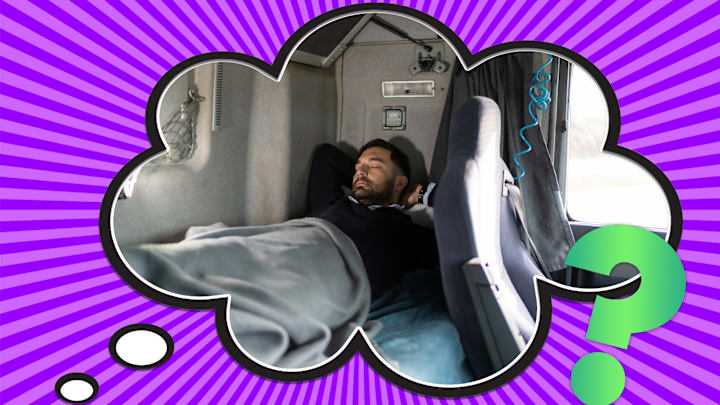Despite what you might think, becoming a truck driver doesn’t necessarily destine you to a life of long, cross-country trips and nights upon nights away from your own comfy bed.
As CloudTrucks explains, some trucking jobs are strictly local, meaning those drivers will never have to complete a trip farther than a day’s drive from home. And since they do get to come home at the end of every shift, they often drive “day cab” trucks—whose engine-bearing front sections, or tractors, just have seats.
Over-the-road (OTR) and regional truck drivers, on the other hand, both spend multiple days away from home. Regional drivers often get to return home for the weekends, while OTR truckers could be gone for a couple weeks straight. Their trucks are usually outfitted with sleeper cabs, which can be quite a bit more impressive than a cranny with a sleeping bag or cot stuffed into it.
According to International Used Truck Centers, mattresses are usually somewhere in the ballpark of 80 inches long and 40 inches wide—roughly the size of a twin XL—though those measurements definitely vary from truck to truck. Sleeper cabs don’t always just contain a place to sleep, either: Some of them have cupboards, shelves, a TV, a fridge, and a microwave. Pricier customized cabins may even boast sinks, stoves, a shower, and a toilet.
As for where drivers park their trucks while they get some shut-eye? It’s generally not on the highway shoulder. According to Schneider National’s blog, the side of the road is reserved for emergencies. Instead, drivers will often post up at rest stops or in parking lots owned by their employer or their customers.
That said, it’s not unheard of for a trucker to spend a night here or there at a hotel. In fact, certain truck companies pay for their drivers to stay in hotels or motels every night they’re not home. Some argue that the drivers are then happier and better rested, leading to less turnover; and also that trucks without sleeper cabs can carry larger loads, which helps offset the cost of lodging.
In short, the answer to “Where do truck drivers sleep?” not only depends on the type of trucking job, but also a company’s business strategy.
Have you got a Big Question you'd like us to answer? If so, let us know by emailing us at bigquestions@mentalfloss.com.
